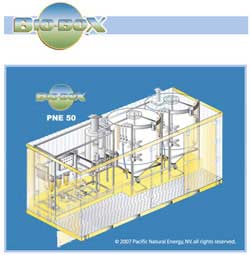Everyone's heard of the avid garage-based hobbyist brewing a biodiesel concoction to fuel his car. And it's old news that oil conglomerates are investing in big biodiesel factories. Yet both approaches forget the largest segment for rapid expansion of biodiesel production and usage, the mid-market producer/user. That's why most national restaurant chains haven't jumped aboard the renewable-energy bandwagon and embraced biodiesel technologies - until now.
Recognizing a need for a more manageable and realistic approach to biodiesel production, the Los Angeles-based Pacific Natural Energy (PNE) (http://www.stopxon.com) has created the BioBox, a mobile processing plant that turns waste vegetable oil into high-quality biodiesel. Able to be located at or near the source of waste, the BioBox is the most efficient, functional mobile biodiesel processing unit made in America. Pacific Natural Energy is the only company offering a total turn-key solution that comes installed in cargo containers for the storage of methanol, waste vegetable oil and refined biodiesel. With the BioBox, those affiliated with waste, recycling and the restaurant industry finally have a way to make biodiesel.
"There are an increasing number of biodiesel companies now, but these companies generally cater to small-scale experimenters and users, or multi-million dollar plants," said Eric McLeod, PNE's founder and CEO. "I believe that mid-market biodiesel production has been completely overlooked. What about the companies that have large waste oil disposals but may be spread over a large geographical region. These clients have everything to gain by producing biodiesel in a location that's convenient for them, and then using it to power their trucking fleets - not to mention being a pioneer in what I think will be the standard for waste vegetable oil recycling."
In addition to saving money, BioBox:
• produces biodiesel, which lowers vehicle emissions, reduces air pollution, and runs cleaner in engines than regular diesel. Biodiesel is known to reduce greenhouse gas emissions when compared to regular diesel by 50%;
• is custom-built to fit customers' unique needs by considering their local resources and specific locations;
• makes renewable fuel, which helps lower foreign-oil dependency;
• comes in standard cargo shipping containers for easy mobility, requires as little as 2,000 square feet of vacant land, and takes only one person to operate;
• includes 4 - 20' cargo containers, the reactor, a hazmat storage container and 2 - 6,000 gallon storage tanking systems.

